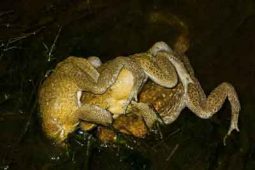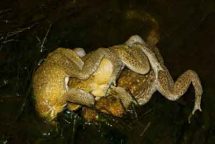
Multiple amplexing cane toads. Image Rick Shine

Multiple amplexing cane toads. Image Rick Shine
New research recently published in Biology Letters has shed a light on the sneaky reproductive tactics of male cane toads. In the frenzied activity around a pond at night, males often inadvertently seize other males, instead of females, in a mating embrace. Males who are seized can give a special call to let a suitor know he’s missed a reproductive target; but some males that are clasped don’t give that call. So, some of the pairs of cane toads embracing each other consist of two males rather than a male and a female.
In Australia’s tropical north, monsoonal rains stimulate cane toads to gather around the local pond to reproduce. The loud calls of amorous male toads attract females to the pond; and a male who encounters a female clasps her from above and behind, in a position known as “amplexus”. He holds on firmly, resisting takeover attempts by his rivals, and the pair moves down into the water where he can shed sperm to fertilise the thousands of tiny eggs released by the female.
In the throes of passion, male toads are famously indiscriminate about who or what they clasp. There are many reports of them seizing native frogs by mistake, or even snakes, human feet, or plastic bottles. So in the heavily male-biased throng of amphibians around the pond, it’s not surprising that many males grab other males instead of females. That’s usually a short-lived embrace, though, because male toads can give a special “release call” to alert their suitor that he has seized a male rather than a female. Female toads can’t give that special call.
But based on their studies near Darwin, researchers Crystal Kelehear and Rick Shine have shown that many male toads stay silent when they are seized. That’s especially likely if the male that has been seized is small and non-reproductive. Since he is in no hurry to chase females, he has little to lose by being held for longer than usual. The male on top eventually realises his mistake and lets go; but why do the males that are seized stay silent? The researchers speculate that calling may attract predators, and accepting a more prolonged embrace by another male may be a better evolutionary option that alerting nearby predators to your presence.








